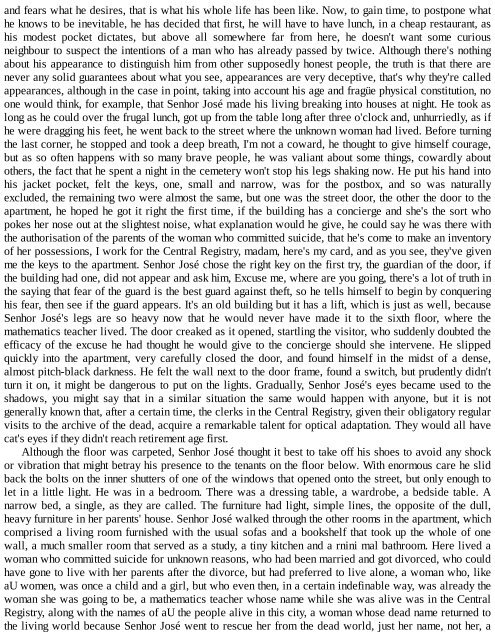Create successful ePaper yourself
Turn your PDF publications into a flip-book with our unique Google optimized e-Paper software.
and fears what he desires, that is what his whole life has been like. Now, to gain time, to postpone what<br />
he knows to be inevitable, he has decided that first, he will have to have lunch, in a cheap restaurant, as<br />
his modest pocket dictates, but above all somewhere far from here, he doesn't want some curious<br />
neighbour to suspect the intentions of a man who has already passed by twice. Although there's nothing<br />
about his appearance to distinguish him from other supposedly honest people, the truth is that there are<br />
never any solid guarantees about what you see, appearances are very deceptive, that's why they're called<br />
appearances, although in the case in point, taking into account his age and fragüe physical constitution, no<br />
one would think, for example, that Senhor José made his living breaking into houses at night. He took as<br />
long as he could over the frugal lunch, got up from the table long after three o'clock and, unhurriedly, as if<br />
he were dragging his feet, he went back to the street where the unknown woman had lived. Before turning<br />
the last corner, he stopped and took a deep breath, I'm not a coward, he thought to give himself courage,<br />
but as so often happens with so many brave people, he was valiant about some things, cowardly about<br />
others, the fact that he spent a night in the cemetery won't stop his legs shaking now. He put his hand into<br />
his jacket pocket, felt the keys, one, small and narrow, was for the postbox, and so was naturally<br />
excluded, the remaining two were almost the same, but one was the street door, the other the door to the<br />
apartment, he hoped he got it right the first time, if the building has a concierge and she's the sort who<br />
pokes her nose out at the slightest noise, what explanation would he give, he could say he was there with<br />
the authorisation of the parents of the woman who committed suicide, that he's come to make an inventory<br />
of her possessions, I work for the Central Registry, madam, here's my card, and as you see, they've given<br />
me the keys to the apartment. Senhor José chose the right key on the first try, the guardian of the door, if<br />
the building had one, did not appear and ask him, Excuse me, where are you going, there's a lot of truth in<br />
the saying that fear of the guard is the best guard against theft, so he tells himself to begin by conquering<br />
his fear, then see if the guard appears. It's an old building but it has a lift, which is just as well, because<br />
Senhor José's legs are so heavy now that he would never have made it to the sixth floor, where the<br />
mathematics teacher lived. <strong>The</strong> door creaked as it opened, startling the visitor, who suddenly doubted the<br />
efficacy of the excuse he had thought he would give to the concierge should she intervene. He slipped<br />
quickly into the apartment, very carefully closed the door, and found himself in the midst of a dense,<br />
almost pitch-black darkness. He felt the wall next to the door frame, found a switch, but prudently didn't<br />
turn it on, it might be dangerous to put on the lights. Gradually, Senhor José's eyes became used to the<br />
shadows, you might say that in a similar situation the same would happen with anyone, but it is not<br />
generally known that, after a certain time, the clerks in the Central Registry, given their obligatory regular<br />
visits to the archive of the dead, acquire a remarkable talent for optical adaptation. <strong>The</strong>y would all have<br />
cat's eyes if they didn't reach retirement age first.<br />
Although the floor was carpeted, Senhor José thought it best to take off his shoes to avoid any shock<br />
or vibration that might betray his presence to the tenants on the floor below. With enormous care he slid<br />
back the bolts on the inner shutters of one of the windows that opened onto the street, but only enough to<br />
let in a little light. He was in a bedroom. <strong>The</strong>re was a dressing table, a wardrobe, a bedside table. A<br />
narrow bed, a single, as they are called. <strong>The</strong> furniture had light, simple lines, the opposite of the dull,<br />
heavy furniture in her parents' house. Senhor José walked through the other rooms in the apartment, which<br />
comprised a living room furnished with the usual sofas and a bookshelf that took up the whole of one<br />
wall, a much smaller room that served as a study, a tiny kitchen and a rnini mal bathroom. Here lived a<br />
woman who committed suicide for unknown reasons, who had been married and got divorced, who could<br />
have gone to live with her parents after the divorce, but had preferred to live alone, a woman who, like<br />
aU women, was once a child and a girl, but who even then, in a certain indefinable way, was already the<br />
woman she was going to be, a mathematics teacher whose name while she was alive was in the Central<br />
Registry, along with the names of aU the people alive in this city, a woman whose dead name returned to<br />
the living world because Senhor José went to rescue her from the dead world, just her name, not her, a



